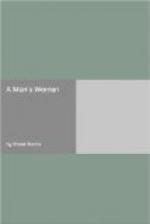But back of him there—he felt it thrilling along the tense-drawn reins—was a calm, powerful grip, even, steady, masterful. Turn his head he could not, but he knew very well that Lloyd had taken a double twist upon the reins, and that her hands, even if they were gloved in white, were strong—strong enough to hold him to his work. And besides this—he could tell it by the very feel of the bit—he knew that she did not take him very seriously, that he could not make her afraid of him. He knew that she could tell at once whether he shied because he was really frightened or because he wanted to break the shaft, and that in the latter case he would get the whip—and mercilessly, too—across his haunch, a degradation, above all things, to be avoided. And she had called him an old pig once already that morning.
Lloyd drove on. She keenly enjoyed this struggle between the horse’s strength and her own determination, her own obstinacy. No, she would not let Rox have his way; she would not allow him to triumph over her for a single moment. She would neither be forced nor tricked into yielding a single point however small. She would be mistress of the situation.
By the end of half an hour she had him well in hand, and was bowling smoothly along a level stretch of road at the foot of an abrupt rise of land covered with scrub oak and broken with outcroppings of granite of a curious formation. Just beyond here the road crossed the canal by a narrow—in fact, a much too narrow—plank bridge without guard-rails. The wide-axled dog-cart had just sufficient room on either hand, and Lloyd, too good a whip to take chances with so nervous a horse as Rox, drew him down to a walk as she approached it. But of a sudden her eyes were arrested by a curious sight. She halted the cart.
At the roadside, some fifty yards from the plank bridge, were two dogs. Evidently there had just been a dreadful fight. Here and there a stone was streaked with blood. The grass and smaller bushes were flattened out, and tufts of hair were scattered about upon the ground. Of the two dogs, Lloyd recognised one upon the instant. It was Dan, the “liver’n white” fox-hound of the farmhouse—the fighter and terror of the country. But he was lying upon his side now, the foreleg broken, or rather crushed, as if in a vise; the throat torn open, the life-blood in a great pool about his head. He was dead, or in the very throes of death. Poor Dan, he had fought his last fight, had found more than his match at last.
Lloyd looked at the other dog—the victor; then looked at him a second time and a third.
“Well,” she murmured, “that’s a strange-looking dog.”
In fact, he was a curious animal. His broad, strong body was covered with a brown fur as dense, as thick, and as soft as a wolf’s; the ears were pricked and pointed, the muzzle sharp, the eyes slant and beady. The breast was disproportionately broad, the forelegs short and apparently very powerful. Around his neck was a broad nickelled collar.




